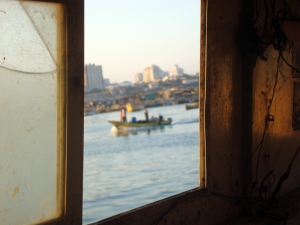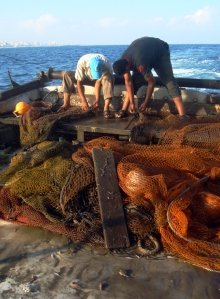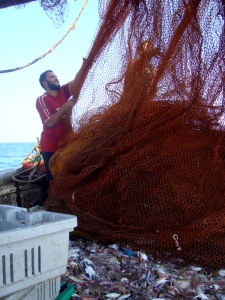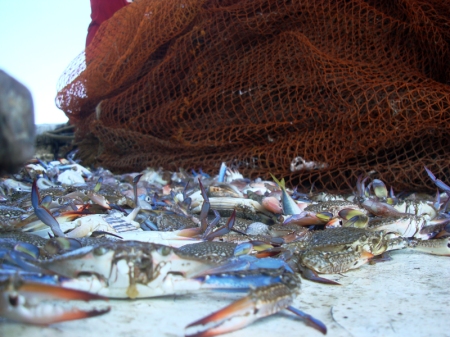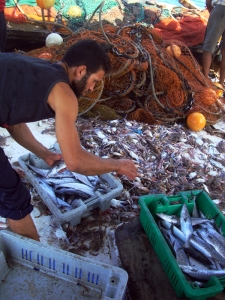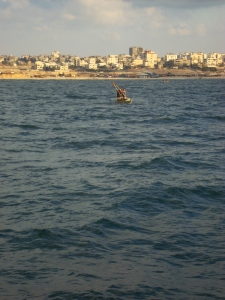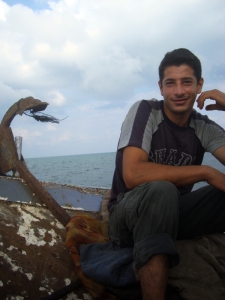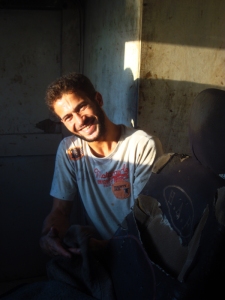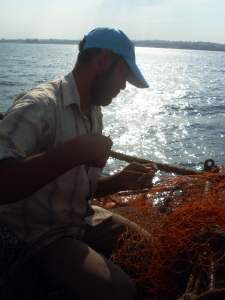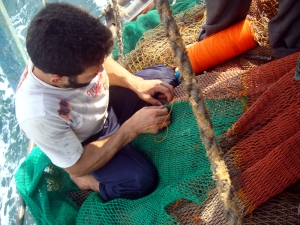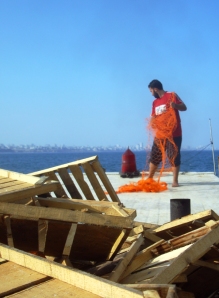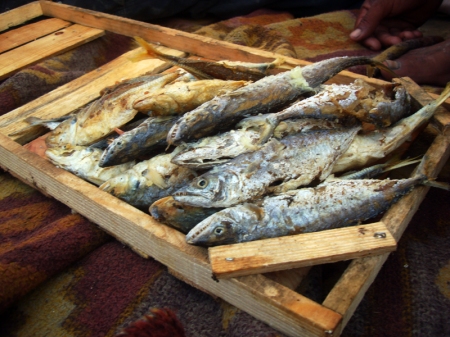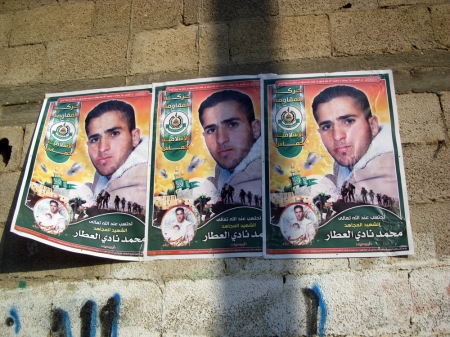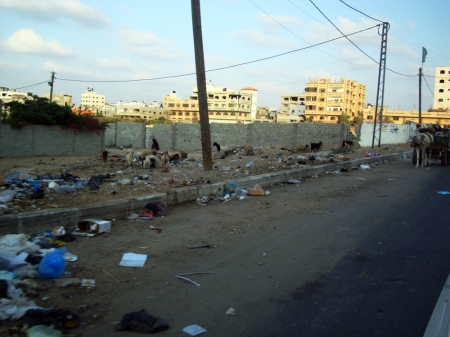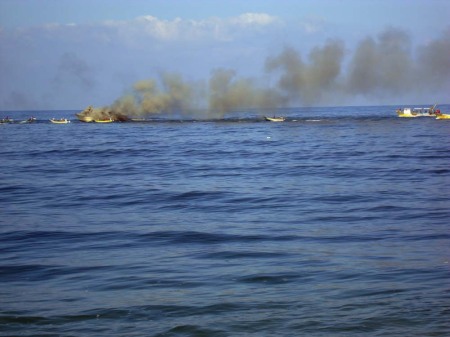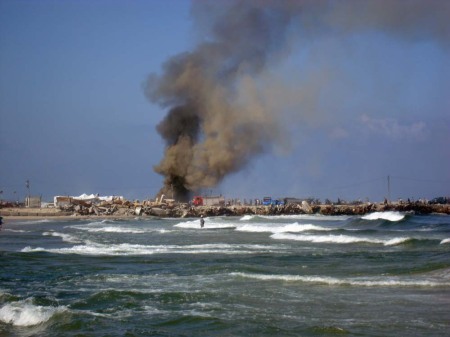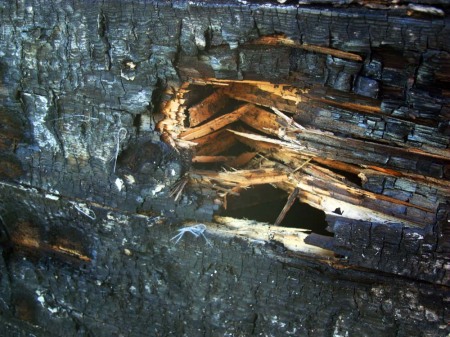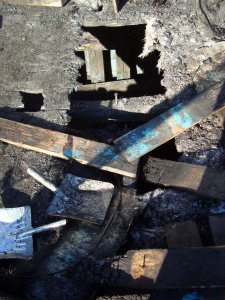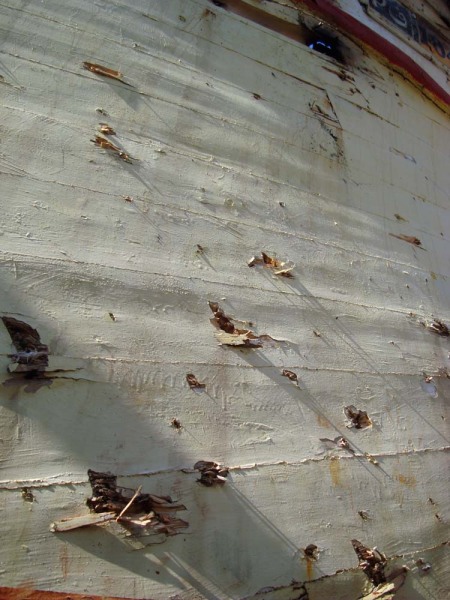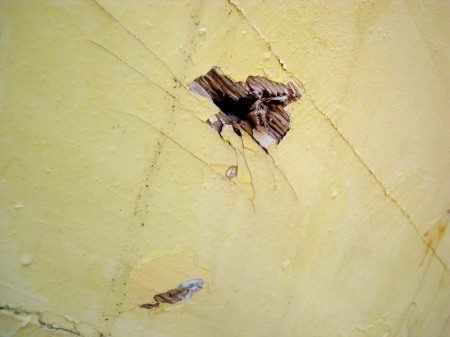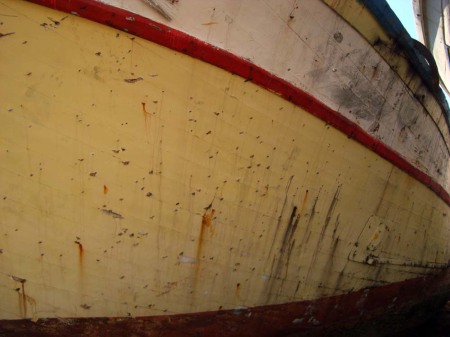Monday, September 28, 2009
Palestinian fishers in Gaza Strip demonstrating for right to earn living without daily harassment
26.09.09 - 21:14
Gaza / Maher Ibrahim – Fishers in the Gaza Strip are asking the international community for protection against daily Israeli aggression both at sea and on the shore.
The fishing industry has been effectively destroyed, Rami Abdo said today, by the Israeli war on the Strip and the continuation of aggression and harassment. Fishing boats and nets are often confiscated and destroyed, fishers are arrested.
Abdo, a spokesperson for the Popular Committee against the Siege said that the direct loss in revenue for each day of closure of the sea is up to 70,000 USD. Other losses are estimated at 30,000 USD per day.
Some 3,500 Palestinians fish in the Gaza Strip with about 700 boats. Engineer Salah Al Jihad from the Department of Fisheries in Gaza’s Ministry of Agriculture, said that 70,000 people live off the sea, and hundreds of those who fish with small boats are not registered with the Ministry. These are concentrated in the northern Gaza Strip where Israeli forces have killed three since the end of the major attacks in January and wounded 22 others. The Ministry has recorded 166 files of complaints of partial and total damage to boats.
The reign for boats along the Gaza beach which runs about 40 kilometers is down from more than 20 nautical miles to only five kilometers, and in some areas that number shrinks to three.
The Ministry of Palestinian Agriculture said today that if a fisher exceeds the boundary, he is subject to being shot, his boat destroyed and his fishing nets cut. Prison, interrogation and heavy fines are also possibilities.
Recently the Palestinian fishing industry was paralyzed to the point that demonstrations became routine in front of offices of international agencies and representatives. Demands include that the United Nations, European Union and the international community at large intervene to lift the naval blockade, and to demand a ceasing of fire and an end to the repeated violations of the right to fish.
Human rights monitoring organizations report that Israeli violations and aggressions against fishers are contrary to the International Covenant on Economic, Social and Cultural Rights of 1966.
Head of the Union of Fishermen in the Gaza Strip, Nizar Ayash, said, “The Israeli targeting of fishermen is part of the ring of closure. The marine problem includes fishermen being detained and violently beaten, both in the sea or near the beach in Gaza, Khan Younis, Rafah, and the central and northern Gaza Strip.”
Sunday, September 27, 2009
Fishing in the Gaza cesspool








Gaza fishermen are allowed a mere two miles out at sea to earn their livelihood. Karl Schembri joins them out at sea as Israeli gunboats looming on the horizon fire warning shots
Karl Schembri
Wed Sep 24, 2009
GAZA CITY, Gaza (Ramattan) - The reeking stench overwhelms you immediately on the sandy Gaza beach, polluted by thousands of litres of untreated sewage dumped into the sea every day since the sewage treatment facilities were destroyed in the January war.
The port greets us with fishing boats completely destroyed in the war and others abandoned on the shore in front of the ruins of boat houses shelled during the Israeli bombings.
A dozen fishermen are on the beach repairing some of their boats with the little material they have. Bullet holes dot most of the sea craft lying on the golden sand.
We board a boat in the port of Gaza with former fishermen who have given up the job they had been doing all their life. The reasons why became clear even before they started telling their stories.
On the horizon, Israeli gunboats could be seen waiting ominously for any craft that dared approach the two to three-nautical mile limit allowed to Palestinians to fish and sail. Approaching that limit, indeed just setting sail, is a risky venture.
“We have turned this fishing boat into a tourist boat, even though there are no tourists. But we always have hope,” Mohammed said as we were leaving port.
Mohammed and his colleagues could no longer make a living out of fishing within the permitted zone. Fish worth catching lie in deeper seas, but Palestinian fishermen have seen their fishing zone diminishing from the 12 nautical miles agreed to in the Oslo Accords to six miles after the 2000 intifada, and now to a measly three nautical miles, although Israelis often shoot at whoever goes beyond two miles.
“There is no radio communication between Israelis and Palestinians on the sea; the communication is by shooting,” Mohammed said. “The fishermen are always on their own out here, away from the media and the public, and whenever there is trouble with Israel they are the first ones to bear the brunt.”
His colleague, Said Saidi, a refugee forced out of the harbour town of Jaffa in 1948, had been fishing for 40 years before he had to give up his livelihood and passion.
“My family has always consisted of fishermen who know and love the sea, but it is now impossible,” he said. “There are no fish to be caught in here.”
As we sailed further out we could see the Israeli ports of Ashkelon and Ashdod up north. We suddenly hear warning shots being fired at a fishing boat heading towards the forbidden lines.
Equally prohibited is the Egyptian side to the south, where Israeli gunboats too lie waiting for any approaching vessel making it impossible for anyone to enter or leave the 25-mile-long coastal strip through the sea. A ship carrying activists from Cyprus intent to break the siege earlier this year was held up by Israeli forces, with all the people on board arrested and eventually deported.
The crippling restrictions on sea faring are yet another facet of the Israeli siege on Gaza; home to 1.5 million Palestinians denied entry or exit by land, sea and air. This makes fish – a long-time source of staple food for Gazans – ridiculously expensive given its scarcity in what should otherwise be an abundant resource.
Meanwhile thousands of litres of sewage keep being pumped into the Mediterranean as pipes and other material necessary to repair the treatment facilities remain banned from entering the strip.
Close to our boat, fishermen on board a battered long line fishing trawler wave at us smiling upon seeing us, making the victory sign with their hands.
But the view of the Gaza skyline from out there was desolate with the bombarded buildings overlooking the Mediterranean Sea.
On survival
The other day I re-visited the family of martyred Mohammed al Attar, killed while net-fishing off the shores of Sudaniya, northern Gaza. They are poor, desperately-so, and have a string of martyrs in their family, including Mohammed’s mother and one brother.
I’d wanted to see them again and found the time a couple of days ago. I’d wondered how this Ramadan and ‘Eid were for them, with another martyr in their thoughts, and one less source of income for their extended family. But I didn’t need to ask, for it was fairly obvious: there was no celebration, no happiness. They were plodding on, surviving, living to die.
Mohammed’s father Nadi had said on an earlier visit that life had little point for him:
“They killed my wife and sons, I don’t care if they kill me or not. There’s nothing I can do, it’s not in my hands,” he’s said of the Israeli army attacks and life under a siege unimaginably brutal.
Fishermen under fire in Al Waha area, northen Gaza Strip
In the Al-Waha area of the northern Gaza Strip, fishermen said they came under fire from Israeli warships. However no injuries were reported.
Thursday, September 24, 2009
Israeli naval vessels open fire on, confiscate fishing boat
Sources at the fishermens union said the boat of the Zaki Abu Odeh family was confiscated from within the three nautical mile fishing limit in the northern Strip. No one on board was notified as to the reason for the seizure or told where the boat was being taken.
Earlier in the day Israeli gunships opened fire on a cluster of fishing boats in the same area. No injuries were reported but fishermen said they fled the scene in fear more shots would be fired.
Wednesday, September 23, 2009
Israeli army storms Gaza shores, 5 fishermen arrested
 Palestine, September 23, 2009, (Pal Telegraph)-Official sources reported that five Palestinian fishermen have been arrested today on Wednesday morning and seized their boats near the coast of Gaza City.
Palestine, September 23, 2009, (Pal Telegraph)-Official sources reported that five Palestinian fishermen have been arrested today on Wednesday morning and seized their boats near the coast of Gaza City.The sources added that the fishing boats have been surrounded by Israeli gunboats, questioned the fishermen, and then took them and their boats to an unknown destination.
It is noteworthy that the Israeli boat set only a distance of 3 miles access for the fishermen to sail and get their livelihood. This very limited area of fishing has been gravely affecting the fishermen to fish good quality of fishing.
One boat which was confiscated, was related to the family of Zaki Abu Oa'dwa. He lives in the north of Gaza, Al Swdania district. Eyewitnesses reported that the boat of Zaki Abu Oa'dwa was in the allowed area of fishing and the Israelis forced him and arrested his boat.
Additionally, it is reported that the Israeli gunboats fired some missiles toward the fishermen but with no casualties, which forced them to get back and stop fishing.
It is worth mentioning that the Gaza fishermen experience daily violation and aggression on their access to get their livelihood.
From Ayman Quader
PT reporter in Gaza
Israeli navy kidnaps five Palestinian fishermen off Gaza City shores
Israeli navel forces kidnapped on Wednesday midday five Palestinian fishermen off Gaza City shores.Local sources reported that navy boats intercepted a fishing boat while people inboard were fishing and kidnapped all five of them and took them to an Israeli nearby port.
The director of the Palestinian fishermen union, Nizar Ayash, told reporters that the Israeli military attack Palestinian fishing boast while in the Palestinian territorial waters.
He added that the Israeli military is trying to minimize the distance that Palestinian fishermen can reach to fish.
Tuesday, September 15, 2009
Israel targeting fishermen, farmers in Gaza
 |
| Masoud Tanboura at Kamal Adwan hospital. (Eva Bartlett) |
On 31 August, Israeli gunboats shot at and shelled the fishing trawler of Khaled al-Habil, destroying it completely and leaving the boat's 18 fishermen and their families without a source of income.
One week earlier, on 24 August, Israeli soldiers along Gaza's northern border shot dead a young farm worker, Said al-Hussumi. Sixteen-year-old al-Hussumi was killed while working on land a few hundred meters from the border with his cousin Masoud Tanboura, who was seriously wounded.
"We were working in Attatra, near the sea, about 350 meters from the [border] fence," said Tanboura of Beit Lahiya.
Tanboura's survival is miraculous as his chest cavity was pierced from left to right by a bullet. After seeing his cousin fall dead upon being shot in the chest, Tanboura ran and walked what he estimates was a kilometer, bleeding heavily from his chest, until he came across farmers with a donkey cart. He was transported by donkey cart until a car was able to take him to the Kamal Adwan hospital.
Israeli military sources told reporters two "suspicious" persons had approached the border with Israel and ignored warning shots.
"There was no warning," Tanboura said from his hospital bed. "The Israelis started shooting as soon as we got to the land."
Farm laborers working for 20 to 30 shekels ($5-$6) a day, the two youths had been scouring for pieces of metal to use to fence off the plot of land. They had gotten closer to the border, but this was normal.
"We went there all the time," said Tanboura. "The Israeli soldiers always saw us, they knew we were just taking metal. Many people go there to take metal from destroyed houses," he said.
According to Tanboura, his cousin's dead body was dragged across the ground by Israeli soldiers who took the corpse to Israel and returned it hours later via the Erez crossing.
Tanboura, like some of his brothers, used the meager salary from day labor on farms to support the 15 other siblings in his family.
Killed while collecting figs
On 4 September, 14-year-old Ghazi al-Zaneen from Beit Hanoun was killed when an Israeli soldier shot him in the head. Along with his father, uncles and some of his siblings, the youth had gone to collect figs on their land east of Beit Hanoun. Although it is near the border with Israel, the farmland where al-Zaneen was killed is still more than 500 meters away.
"They had driven to the land and were walking in the area. Ghazi got up on the rubble of a house to look further. Then the Israelis started shooting heavily. Everyone lay on the ground. When the shooting stopped, they got up to run away and realized that Ghazi had been shot in the head," said his aunt.
Maher al-Zaneen, Ghazi's father, testified to the Palestinian Centre for Human Rights that Israeli soldiers continued to fire as he carried the injured boy to the car. Ghazi al-Zaneen succumbed to his critical head injuries the following day.
The day after his death, Ghazi's mother sat surrounded by female relatives and friends. She asked, "How would mothers in your country feel if their sons were killed like this? Don't your politicians care that Israel is killing our children?"
Israeli authorities reportedly claimed that "suspicious Palestinians approached the fence" and troops responded by "firing into the air." But the shot to Ghazi al-Zaneen's head and the two bullet holes in Maher al-Zaneen's car suggest otherwise.
Since the end of Israel's three-week winter invasion of Gaza during which approximately 1,500 Palestinians were killed, nine more Palestinian civilians have been killed at sea or on the strip's border regions. This includes four minors and one mentally disabled adult. Another 30 Palestinians, including eight minors, have been wounded by Israeli shooting and shelling, including by the use of "flechette" dart-bombs on civilian areas.
According to the Food and Agricultural Organization, roughly one third of Gaza's agricultural land lies within the Israel's unilaterally-imposed "no go zone," or "buffer zone." This band of land stretching south to north along Gaza's borders to Israel was established in late 2000 during the second Palestinian intifada. Initially set at 150 meters, it has varied over time. At one point, it was nearly two kilometers in the north and one kilometer in the east. At present, Israeli authorities say 300 meters along the border are "off limits" and those found within the area risk being shot at by Israeli soldiers.
However, one case demonstrates that Israeli soldiers will shoot at Palestinian civilians as far away from the border as 1,800 meters. Sixty-three-year-old Fawzi Ali Qassem was on his land east of Beit Hanoun, at least 1,800 meters away from the border, when Israeli soldiers opened fire on farmers. Ali Qassem was hit in his left thigh on 23 August 2009.
Under a brutal 27-month-long siege, the Israeli military is killing fishermen, farmers and other civilians in areas it is deliberately trying to depopulate. This represents yet another component in Israel's matrix of control over the lives of Palestinians in Gaza. In the face of such blatant Israeli military terrorizing, Palestinians remain defiantly resilient, farming, fishing and living under fire.
Eva Bartlett is a Canadian human rights advocate and freelancer who arrived in Gaza in November 2008 on the third Free Gaza Movement boat. She has been volunteering with the International Solidarity Movement and documenting Israel's ongoing attacks on Palestinians in Gaza. During Israel's recent assault on Gaza, she and other ISM volunteers accompanied ambulances and documenting the Israeli attacks on the Gaza Strip.
Israel opens fire on Lebanese fishing boat
PRESS TV
The Lebanese army command said on Monday that Israeli military forces fired from their position in Naqoura on a Lebanese fishing boat in Lebanese waters on Sunday.
There were no immediate reports of damage or casualties from the incident, which came two days after an Israeli rocket attack on southern Lebanon.
The Israeli army fired eight shells into a fruit plantation near the city of Tyre on Friday after two Katyusha rockets wre fired across the Lebanese border into northern Israel.
According to Lebanese authorities, despite a UN resolution calling for "a full cessation of hostilities", Tel Aviv frequently violates Beirut's land, sea and air space. UNSC resolution 1701 ended the 33-day offensive against Lebanon's resistance movement Hezbollah in 2006.
HE/TG/DT
Israeli forces target Gazans from sea, northern border and south

The attack, which left the men in moderate condition, followed two other incidents earlier in the day.
Israeli naval squadrons opened fire on Gazan fishermen in their boats off the shore of Tel As-Sultan in Rafah on Tuesday morning, and military forces clashed with fighters in the north. No injuries were reported from either incident.
Eyewitnesses reported an Israeli gunboat fired on a cluster of fishermen on the southern coast of Gaza without warning, causing no damage or injuries.
In the north near Beit Lahiya, the Popular Front for the Liberation of Palestine (PFLP)'s military wing, the Abu Ali Mustafa Brigades, reported a clash with invading Israeli forces near the border area at the As-Sifa neighborhood. A statement from the group said Israeli forces responded with machine gun fire and small grenades.
In their statement the group said they would maintain their resistance operations as a method of resisting the Israeli occupation.
Sunday, September 13, 2009
Gazan fishermen continue stuggle for livelihoods






Ma'an
Gazan fishermen have a three nautical mile area from the Strip's shore in which to cast their nets. The area was reduced from six miles down to three following Israel's war on Gaza in December and January, and Israeli naval ships continue to patrol Gaza waters, firing on fishermen and their crafts as well as empty shorelines and busy beaches.
Dozens of fishermen have been ordered to leave their boats and board Israeli war vessels, with boats being confiscated and often not returned to the men for weeks or months.
Fishing sites are often contaminated with waste run-off from broken water treatment facilities in the Strip, many damaged during the war on the area, which remain damaged and leaking as repair materials and equipment have been barred from the area.
Tuesday, September 8, 2009
musings from a fishing boat: Gaza Ramadan day 15
In Gaza
*Palestinian fisherman repairs a net using old nets; new fishing nets are unavailable or highly expensive in Gaza under the Israeli-led siege
Palestinian fishermen and farmers are some of the livelier, slightly crazier, people I’ve met. Maybe it’s the constant exposure to the dangers of Israeli shooting and shelling. Come to think of it, Palestinian medics share these dangers and this zaniness as well.
Fishermen have little to no other option but to risk the assault of the IOF gunboats as they fish in their own waters. But they do it with flair.
F. is the liveliest of today’s crew. Mischievous, with endless energy, he captains the boat and jumps in to help with the different tasks on board.
We head north, not far out from the coast, maybe 2 km (they would go deeply were the 20 nautical mile fishing limits respected by Israeli gunboats; instead, Israeli gunboats –through shelling, shooting, water cannons, and abductions of fishermen –impose their own unilateral limitations –from high up, to be certain –of 3 miles, cutting down boats even within that 3 mile limit).
The boat is a trawler, maybe 15 metres long, fitted with a pulley system allowing their nets to be dropped into waters over 200m down. After dropping, the boat will saunter for a while, picking up fish as it moves back south. Nets will be hauled in, and a sad catch* will be sorted on deck, neatly packaged in plastic containers and stowed away, and the process will begin anew.
In the 12 hour shift they’ll drop their nets about 4 times, if they are not first stopped by Israeli gunboat shooting or shelling [just last week, an Israeli gunboat fired heavily at a Palestinian trawler, finally shelling it and causing it to catch afire, burning it completely. The trawler is destroyed]. They will actually stay out 24 hours, but this novice seafarer can handle only 12 for the time.
At the northern end, we see the smokestacks of industry (functioning, as opposed to Gaza’s, which under the recent Israeli massacre and the Israeli-led siege has seen 95% collapse, meaning more jobless turn to the seas, meaning more overfishing in a limited area…) in Ashdod. The towers mark the land where life flows without siege, naval attacks, air raids…
It’s always strange to see the built-up areas of Israel just beyond Gaza’s ravished northern border. From a once-lush land holding different fruit and olives trees but now dustily near-barren, void of most structures (see piles of rubble) one’s eye travels past the industrial area proximate to Gaza,to the high-rise apartments along Israel’s coastline.
It’s strange also to realize, internalize, just how small Gaza is. So much happens to so many people in such an unbelievably tiny Strip.
To the east, a pair of hassaka fishermen paddle their light craft out, readying to drop their nets and make a go of fishing another day. Last week, on August 27, a fisherman swimming out to drop a net was shelled by an Israeli gunboat. The shell tore his head off.
Nets dropped, A. takes a break, sprawls on the deck, sings a little, and smiles a lot. “Bumoot fil bahar,” he says ['I love the sea to death'].
H. is quieter, but still has the same devilish smile and laughter they all share.
I realize F. reminds me of one of the medics I worked with during the Israeli massacre of Gaza. Same haphazard ‘whatever happens, happens’ attitude. Same generous smile. He leans back, steers with his feet, lights a cigarette and drinks the coffee H. has just made for us (it’s Ramadan, but many, although strong believers, aren’t fasting. It’s hard work, long hours, and many decide they’d rather eat, drink, smoke and have energy than be overly devout).
Then they’re up again, onto the roof, working again. F. is repairing a gutted net, using bits of other unusable nets to patch it up. A. is creating a new net, deftly weaving his net needle in patterns ingrained in his mind and muscle memory.
The nets are pulled in again. It takes a good 10 minutes, with F. running from winch motor to rope cables, making sure things go smoothly.
It’s easy to understand why fishermen are so vulnerable when nets are down. Expensive and difficult to replace, you don’t want to cut them. But when the IOF begin intensely shooting, the fishermen sometimes have to drop their nets.
Finally the nets appear. F. is in the middle, watching the catch come in. He turns with a mock spit of disgust: a small catch.
I snooze on the deck, nice breeze, sunshine, and wake up some time later to the shots. The gunboat is still far away, and the shots are half-hearted, not close this time. A few lame shells follow, but also are far enough away. It’s hit and miss with the IOF gunboats; they are unpredictable, and the fishermen know this. But with so little fishing space, the Israeli authorities having imposed their down-sized limits on Palestinians, the fishers push these limits, go to the edges and corners. After all, its still their waters, beyond the ‘limits’ is still their sea.
In my napping I’ve had a blanket put over me, and as it is hot, I shrug it off while dozing. It is twice replaced by unseen, caring hands.
In the cabin, F. is finishing some fool (beans) and offers me a piece of bread and glass of tea. He is buzzing with energy and begins to dance to the radio, finally leaning out the front window with a grin, eyes closed in the breeze. He relishes the sea, his work, the freedom (downsized and shot up as it is).
The day continues with net drops and sparse catches, much teasing among the five fishers, all good-natured and giddy.
Always, as we trawl, there are a few other fishing boats near us, going through the same routine, likely the same antics on board.
F. has fished for fifteen years and remembers the days when they went deeper, were actually out at sea, fished without other boats around. There is affection among most of the fishermen, and they watch out for one another when the IOF gunboats attack. But they used to roam further and, consequently, not tap the same sources repeatedly.
A. has broiled fish and brings the crate of delicacies out for all to share, with bread.
Sunset comes, we head south to the Gaza harbour, they drop us and ready to head back out for their night in southern waters: it’s shrimp time.
We wish each other well and plan the next trip; M. is determined to bring some vegetables for me, noting my vegetarian tendencies, and wants to know exactly what day I’ll come so he can prepare.
These men, giving, crazy, working hard, laughing hard…I will think of them from the land, particularly when the IOF shelling and gunfire ring out.
*[A December 2008 article noted this about the decline of the Palestinian fishing industry:
"The United Nations estimates that a distance of 12-15 nautical miles off Gaza is the minimum required to access the larger shoals of fish for maximum economic benefit.
Due to over-fishing in shallow waters, the stocks of smaller fish closer to shore have almost been depleted without having the chance to reproduce. The more lucrative shoals of tuna are also found further out.
The cost of one fishing trip can vary between 125 and 625 dollars, depending on the size of the vessel, nets and crew, and many fishermen cannot cover their costs from the resulting catch. They have no option but to remain on shore.
Collectively, Palestinian fishermen saw their monthly catch drop from 823 tons in June 2000 to as low as 50 tons in late 2006, according to the UN."]
Saturday, September 5, 2009
recent and past martyrs: Gaza Ramadan day 13
His murder was just another passing name in the news. Fisherman killed in the north of Gaza by Israeli navy shelling. Decapitated by the blast.
Another gruesomely martyred Palestinian. The world somehow expects it over there.
But beyond being a statistic in the tally of Palestinians lost to Israeli targeting, Mohammed is the 4th close family member to be killed in three years, not including cousins or other relatives. Preceding him were one brother, and his mother and a nephew, the latter 2 killed together on their farmland. With them was another brother who survived the ground-to-ground missile. His legs didn’t, however.
Another brother was seriously injured by Israeli army shooting while he was fishing off the shore of northern Gaza.
Like Mohammed.
*Nadi al Attar with his martyred son’s children Yasmiin (5) and Said (3).
An impoverished family, fishing is their only source of income. They fish from land, wading into the sea to cast nets which catch smaller fish, like sardines. Laborious work, with little fruit, but their only option. Now just one surviving son works, as does Mohammed’s 59 year old father Nadi, wading into the same waters Mohammed was just martyred in.
A taxi driver related how he had delivered Mohammed to the sea the morning of his killing, and later that afternoon delivered Mohammed’s body, in pieces, to the morgue.
On the return to Gaza City, I see more flocks of sheep grazing in garbage filled lots, for want of proper pastures. Those who herd in the fertile border areas known as the ‘buffer zone’ very seriously risk being shot and killed by Israeli soldiers.
Along the coastal road, nearing Beach Camp just outside Gaza city, some boys sit on a small patch of grass surrounded by the usual sand, rubble and garbage. One playfully jumps over the razor wire fringing this grass; razor wire is everywhere, part of the Gazan landscape, left from the days of Israeli settlers and soldiers in Gaza. Now that Israel has pulled its illegal settlers out of Gaza, the occupation continues via military control of borders, air, and sea. Mohammed al Attar’s murder is just the latest evidence of this military occupation.
Many times in this Ramadan month, you forget it is Ramadan, a time during which Muslims not only pray and honor Islam, but also delight with family in friends.
You forget because for so many there is so little to delight in.
PFLP plans international campaign to support Gaza fishermen against Israeli attacks

PFLP plans international campaign to support Gaza fishermen against occupation attacks


The Popular Front for the Liberation of Palestine pledged to intensify and build upon its work with Gaza fishermen to raise awareness about their suffering due to the aggression of the occupation, and work to build Palestinian, Arab and international support for the fishermen of Gaza.
Dr. Rabah Muhanna, a member of the Political Bureau of the PFLP and its leader in the Gaza Strip, led a PFLP solidarity delegation that met with the El-Tawfiq Cooperative Society of Fishermen on Wednesday, September 2, 2009, saying that "the Front expresses its full solidarity with the fishermen, who are constantly exposed to aggression from occupation naval forces while trying to secure their livelihood and provide a needed resource in Gaza by fishing from their own shores in Gaza, and pay the price of the siege, and also suffer the consequences of Palestinian internal division."
Dr. Muhanna said further that the Front pledges to stand by the fishermen and will follow up on this meeting with work to support their steadfastness and provide relief, and that the struggle of the fishermen is a national and political issue for the Palestinian people. He said to the fisherman, "Continue to fight your battle, confronting the occupation, the division and the siege - your steadfastness strengthens all of our people." A number of PFLP leaders, as well as leaders of civil society institutions and trade union and labor activists participated in the delegation.
Mahmoud Assi, chairman of the fishermen's association, detailed the struggles of the fishermen, describing the constant attacks and infringements upon the fishermen by occupation forces. He listed those killed and wounded while trying to obtain their livelihood on Gaza's shores, emphasizing that this terror against fishermen has raised the level of unemployment in the sector. He pointed out that fishermen are subject to great injustice, noting that Gaza is surrounded from all sides by siege and occupation and the sea is the only outlet - and is also besieged and subject to occupation. He noted that the fishermen's association has a debt of over 1 million shekels, as it provides for fishermen's needs and relies on dues payments which often cannot be made because of the high levels of poverty and unemployment.
He noted that the occupation prohibits fishermen fishing further than 3 miles from the shore, noting that the occupation has continually reduced this distance from 20 miles in 1993 to 2-3 miles today, before the fishermen face hostile live fire.
One of the labor leaders present at the meeting pledged support of the workers' organizations, noting that fishing has become one of the most dangerous occupations due to the attacks of the occupation forces.
The PFLP pledged to develop campaigns on Palestinian, Arab and international levels in support of the fishermen, and to develop international labor and maritime union solidarity campaigns with the fishermen of Gaza, as well as to emphasize the need for international solidarity to highlight the plight of the fishermen of Gaza.
Israeli forces incinerate Gazan fishing boat
ISM Gaza
3 September 2009
In November 2008 Abu Adham’s fishing boat was seized by the Israeli Navy and all the fishermen were abducted and transferred to Israel. The fishermen and boat were subsequently released without charge.
In June 2009 the Israeli Navy attacked the boat, riddling it with machine gun fire, causing extensive damage, and nearly killing the crew. The boat was then seized and the fishermen were abducted and transferred to Israel. On route to the port of Ashdod, Adham the captain of the fishing boat was beaten up by the Israeli sailors. The fishermen and the boat were subsequently released without charge.
On 31st August 2009 the Israeli Navy attacked several fishing boats as they were at work in Palestinian territorial waters. Abu Adham’s boat was riddled with bullets, and bombarded with shells. Flames engulfed the boat. Despite managing to tow it back to the port in Gaza City as it was burning, the fishermen were unable to prevent the boat’s destruction.
Two days before this attack, the Israeli Navy killed a Palestinian fishermen in the same area. It’s reported that he was but four metres from shore when an Israeli gun boat fired a shell at him. He was decapitated.
Friday, September 4, 2009
PCHR weekly report 27/8 - 2/9/2009: 1 Palestinian fishermen KILLED several injured, fishing boats destroyed or damaged

Fire breaking out in a Palestinian fishing boat as it was fired at by the Israeli gunboats near Gaza
Thursday, 27 August 2009
At approximately 13:20, IOF gunboats stationed opposite to Beit Lahia town in the northern Gaza Strip fired a shell at a number of Palestinian fishers who were swimming and fishing nearly 700 meters away from the beach. As a result, Mohammed Nadi Saleh al-'Attar, 25, from Beit Lahia, died after being decapitated. Additionally, Salem Mahmoud al-'Attar, 24, who was near the victim, suffered from shock.
Monday, 31 August 2009
At approximately 08:15, IOF gunboats stationed opposite to Beit Lahia beach in the northern Gaza Strip opened fire at Palestinian fishing boats which sailed beyond the limit specified by IOF. As a result, fire broke out in a fishing boat belonging to the al-Habeel famil, from al-Shati refugee camp in the west of Gaza City. Fishermen on the boat were lightly injured as they jumped into water when fire broke out in the boat. IOF gunboats attempted to extinguish fire, but they could not. They then allowed other Palestinian fishing boats to pull the affected boat towards the beach, where the fire was extinguished by Palestinian civil defense crews. Additionally, a fishing boat belonging to 'Abdul Mo'ti al-Habeel was damaged.
Israelis destroy boats, and lives
Eva Bartlett | Inter Press Service
3 September 2009
In Gaza: Israeli Navy Terrorism: Destroying Boats and Lives
(IPS) – Until Monday, Omar and Khaled Al-Habil were the owners of a 20m fishing trawler staffed by five or six fishermen at a time, but employing around 18 in cycles. But that morning the vessel came under heavy Israeli navy machine-gun fire, and then shelling. The trawler caught fire.
“It’s destroyed, completely destroyed,” says Al-Habil.
“They had left early in the morning and headed north,” Al-Habil said, of the crew of five fishermen that morning, including his son Adham Al-Habil. He says the boat was well within a three-mile limit set by Israel.
“There were other fishing boats with them. The boat was about a kilometre out off Gaza’s coast, and was at the southern end of Sudaniya (a coastal region of Beit Lahia, northern Gaza).”
An Israeli navy spokesperson reportedly said the boat “violated security boundaries off the coast of the Gaza Strip” and was “out of the permitted fishing zone.” She said the boats failed to respond to warning shots.
Khaled Al-Habil recalls differently.
“An Israeli navy boat approached them and opened fire. It was chaos. The firing was intense; it lasted 15 or 20 minutes. The fishing boat stopped, but the Israelis kept shooting. Finally, the Israelis shot a mortar at the boat. All the fishermen jumped into the water.”
His son Adham Al-Habil sustained burns from the fire, which broke out most likely as a result of the mortar shelling.
A charred hole on the front right-hand side of the boat marks where the mortar hit and exited. From that point down, the deck is blackened with soot. The metal steering wheel is all that remains of the cabin.
“Other fishermen came to help. They towed my boat back to Gaza port,” said Al-Habil. Once there, it took fire-fighters more than 20 minutes to put out the fires.
Palestinian fishers have the right to fish as far as 20 nautical miles from the coast of Gaza, but Israeli authorities have over the years unilaterally reduced that limit to three miles. The more abundant catches are found past six miles.
The Palestinian fishing industry, employing more than 3,500, has been devastated by Israeli attacks on fishing boats, confiscation of boats and equipment, and the abduction of Palestinian fishers.
Under the Israeli-led siege, with the complicity of Egypt, Gaza is starved of basic goods to enable a functioning economy and society. This includes replacement parts for missing or broken fishing equipment.
While a reported 95 percent of Gaza’s industries have shut down due to the siege, many unemployed Palestinians have turned to fishing, unviable as it is.
The United Nations Office for Coordination of Humanitarian Affairs (OCHA) August 2009 report details the devolution of the fishing industry.
OCHA cites the fishing catch for the month of April for the past three years. In 2007, fishers hauled in 292 tons. In 2008, the catch was 154 tons, and in 2009 it was reduced to 79 tons.
Reduced to fishing along the coast, many of the fish are caught in waters contaminated by the 80 million litres of raw or partially-treated sewage pumped daily into the sea “as a result of lack of maintenance and upgrading of the wastewater infrastructure,” OCHA notes.
And now Al-Habil does not have a fishing vessel at all.
This was not the first problem for his now destroyed boat. On Jun. 4, Israeli gunboats abducted six fishers and seized Al-Habil’s boat three miles off the northern coast of Gaza, holding it for 45 days before returning it. Al-Habil found equipment missing and significant damage done to the engine and cables.
On Nov. 18, 2008, Israeli gunboats surrounded three Palestinian fishing boats, including Al-Habil’s boat, seven miles off the coast of central Gaza, and took all 15 fishers on board, as well as three international solidarity activists. The Israelis kept the boats until Nov. 27.
“It’s not just my boat. Every day the Israelis are attacking us: if not a trawler, then a small boat, or on land.”
Palestinian fisher Muhammed Al-Attar was killed by Israeli shelling off northern Gaza Aug. 27. Head of emergency services Dr Mu’awiyah Hassanein said Al-Attar was decapitated by the blast.
The Palestinian Centre for Human Rights (PCHR) reports that 12-year-old Mohammed Bassam ‘Aashour was seriously injured by a gunshot to his head Aug. 14 when Israeli gunboats fired on Palestinian fishing boats near Rafah coast.
Khaled Al-Habil is just one among many Palestinian fishers whose livelihoods have been wrecked. The father of 13 children lives with his family in a cramped 400 square metre apartment. His only source of income has been destroyed.
“I want a good lawyer,” he says, “and I want to take this to court.”
*from the United Nations’ OCHA August 2009 report
attacked by the Israeli navy: a shelled Palestinian fishing trawler is “completely destroyed”
videos of Israeli naval boats attacking Palestinian fishermen






